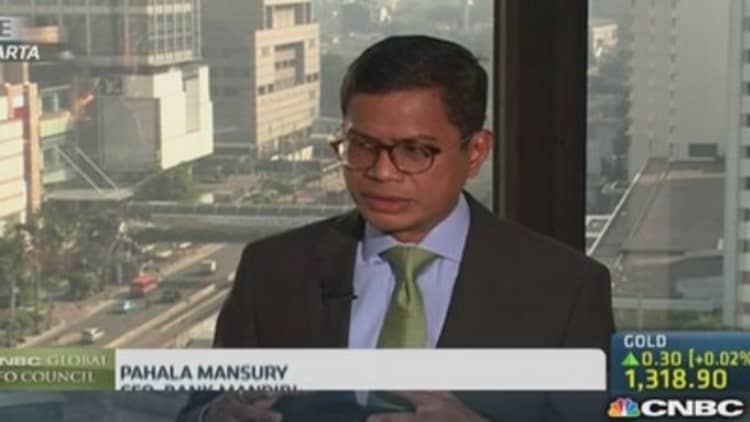Flags from Brazil, France, Argentina, Germany and other World Cup countries line the streets of Manado, the capital city of the North Sulawesi province of Indonesia.
That was just days before Indonesians, who make up the world's third-largest democracy, went to the polls to vote for a new president on July 9 and a sign perhaps that soccer rather than election fever gripped the region.
Intermingled with the World Cup flags however, are election posters and the importance of the vote on this remote part of Southeast Asia's biggest economy cannot be underestimated.
Read MoreDo investors care who wins Indonesia's election?
The roads in Manado are full of potholes, as are many others in the province, slowing down journeys. Access to electricity is also limited, making infrastructure one of the biggest issues local residents would like the country's new president to address.
"The need for good infrastructure – electricity, water, roads – are all important here," said the owner of tourist villas on the edge of the Tangkoko National Park who goes by the name Oudy.
"The next president has to pay more attention to infrastructure in the east. We have no trains here and it's very expensive for farmers to get their products to market," he added.
Read MoreIndonesia stocks surge to 1-year high post election
Indonesia has a creaking infrastructure that both presidential candidates, Jakarta Governor Joko "Jokowi" Widodo and ex-general Prabowo Subianto, have vowed to fix.
Jokowi and Prabowo have both claimed victory based on quick counts of votes conducted by private agencies and the official election results are expected around July 22. The new president is not due to take office until October 1.
Creaking
A good infrastructure network not only supports trade and manufacturing, but also boosts productivity and can help ease supply bottle necks that fuel inflation. Without decent infrastructure – roads, airports, electricity supply – an economy cannot reach its full potential, economists say.
Read MoreIndonesia votes: 5 things you need to know
Indeed, Indonesia is not the only country in Asia with an infrastructure issue – India, which recently elected a new prime minister, also faces a pressing need to fix its infrastructure.
Total infrastructure investment from the past decade by the central government, sub-national governments, state-owned enterprises and the private sector, is less than 4 percent of gross domestic product (GDP) – about half of what is needed, the World Bank said in a June report on Indonesia's economy.

It estimates that Indonesia has lost at least 1 percent of economic growth each year over the past decade due to this low investment.
The Indonesian economy grew an annual 5 percent in the first quarter of the year – that rate could go up to between 7 and 9 percent with adequate infrastructure, economists say.
Read MoreIn pictures: Indonesia votes
While a number of significant projects such as expanding the country's largest port have got off the ground in recent years, others worth billions of dollars have failed to take off.
No new railway line has been built in Indonesia since the end of Dutch colonial rule almost 70 years ago, according to a recent report from Reuters.
"My home town of Bintan, close to Singapore but remote by Indonesian standards, is also hurt by poor infrastructure so this is a topic close to heart," said OCBC Bank Economist Wellian Wiranto, referring to power blackouts on the island. "The framework for setting up a good infrastructure is still shoddy so we are not there yet.
Solutions?
Corruption, low investment and the lack of a structure to implement regulations have all held back infrastructure development, analysts say.
Read MoreWhat taper tantrum? EM bonds return to peaks
"The world is waiting for Indonesia to take its rightful place as a global economic leader. But to do so, Indonesia must improve its competitiveness, by closing its infrastructure and skills gaps and by improving the functioning of markets," Rodrigo Chaves, World Bank Country Director for Indonesia said in a report.
"These actions would have knock-on effects on raising productivity and incomes, and would require better government spending that cuts inefficiencies, such as fuel subsidies," he added.
Cutting costly fuel subsidies – that's something analysts say would free up cash to invest in infrastructure. Fuel subsidy spending amounts to 2.6 percent of GDP, according to the World Bank and it says that cutting back on this would allow the government to spend more on infrastructure and other pressing needs, such as health-care, which is currently only 0.9 percent of GDP.
Read MoreIndonesia, Brazil markets to catch election fever?
"Fuel price cuts are only short-term but once they're done, you're good to go," said Edimon Ginting, the deputy country director for Indonesia at the Asian Development Bank.
"The new government needs to focus on reforms, improving Indonesia's competitiveness – during the election campaign both candidates have hit hard on this, whether it's infrastructure, human resources or productivity," he told CNBC.

